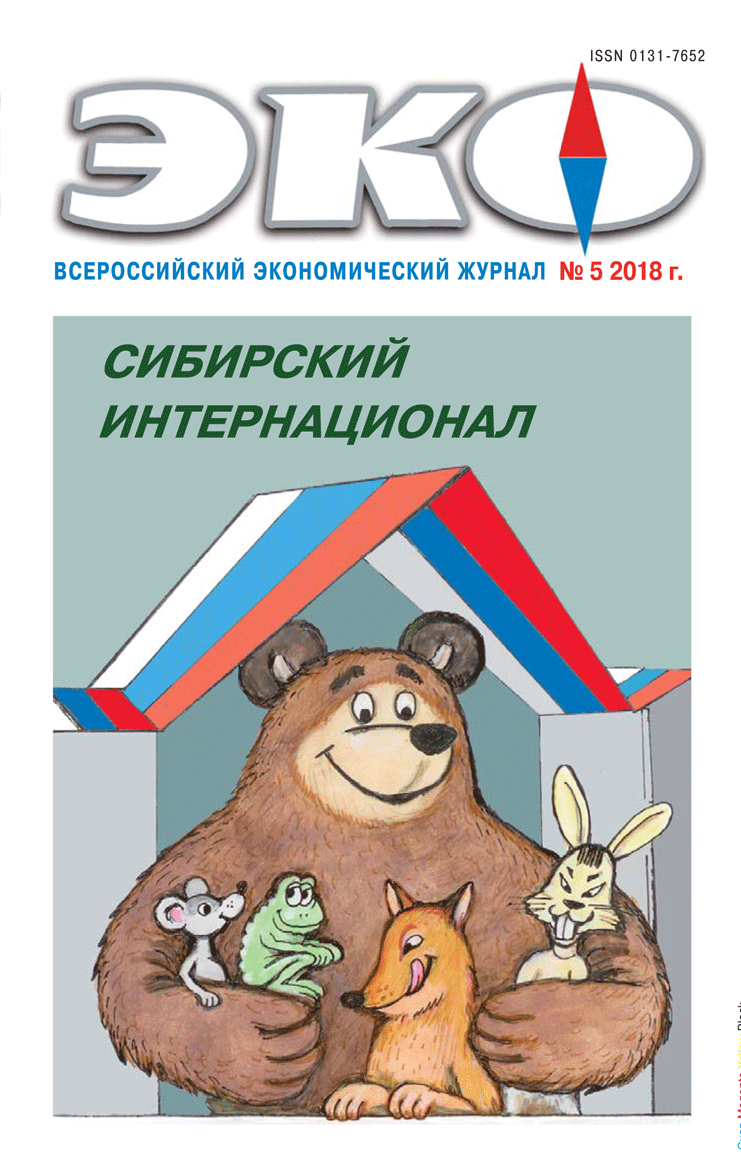COVER STORY: SIBERIAN INTERNATIONAL
Published 2018-07-09
Keywords
- МONOETENIZATION,
- REDUCTION OF ETHNOCULTURAL DIVERSITY,
- MIGRATION OF RUSSIANS,
- INTERETHNIC RELATIONS,
- RUSSIAN LANGUAGE
- TRADITIONAL CULTURE ...More
How to Cite
1.
Tarbastaeva И. Tuva Turns to the Monothern Region: Risks and Prospects. ECO [Internet]. 2018 Jul. 9 [cited 2026 Feb. 9];48(5):65-80. Available from: https://ecotrends.ru/index.php/eco/article/view/1202
Abstract
The article raises the problem of reducing ethno-cultural diversity in the Republic of Tyva. Data are given that attest to the migration outflow of the Russian population outside the region. It is shown that the factors contributing to the monoetinization of the republic include the economic backwardness of the subject, the unsatisfactory social state of the Russians who are in the status of an ethnic minority. It is concluded that monoetanization has an unfavorable effect on the titular ethnos. In particular, the reduction of interethnic cooperation on a professional basis hinders the enrichment of Tuva residents with the skills necessary for the effective conduct of economic activity in modern conditions. Regional authorities recognize the current situation as unfavorable, and take non-standard solutions for its correction. Positive factors include the feeling of pride of Tuvinians for preserving traditional culture, the possibility of developing ethnoeconomics.References
1.
Балакина Г. Ф., Кылгыдай А. Ч. Особенности адаптации этнических групп Тувы к рыночной экономике//Новые исследования Тувы. 2016. № 2 (30). URL: https://cyberleninka.ru/article/n/osobennosti-adaptatsii-etnicheskih-grupp-tuvy-k-rynochnoy-ekonomike (дата обращения: 15.03.2018).
2.
Демократизация и образы национализма в РФ 90-х годов./Л. М. Дробижева, А. Р. Аклаев, В. В. Коротеева, Г. У. Солдатова. РАН. Ин-т этнологии и антропологии. М., 1996. 282 с.
3.
Кан В. С. Этносоциальный профиль тувинцев //Новые исследования Тувы. 2016. № 2. URL: http://nit.tuva.asia/nit/article/view/94 (дата обращения: 10.08.2016).
4.
Кужугет А. К. Тувинцы и русские в контексте изучения чувства национального достоинства (постановка проблемы)//Новые исследования Тувы. 2010. № 3 (7). URL: https://cyberleninka.ru/article/n/tuvintsy-i-russkie-v-kontekste-izucheniya-chuvstva-natsionalnogo-dostoinstva-postanovka-problemy (дата обращения: 15.03.2018).
5.
Моллеров Н. М. Истоки братства. Русская самоуправляющаяся трудовая колония в Тувинской Народной Республике. Кызыл, 1989.
6.
Ойдуп Т. М. Горнодобывающий комплекс Тывы и будущее республики//ЭКО. 2006. № 10. С. 111-116.
7.
Орлов А. Ю. Историко-географические аспекты трансформации этнической структуры населения Российской Федерации//Региональные исследования. 2013. № 2. С. 120-124.
8.
Попков Ю. В. Этносоциальные процессы и этнонациональная политика//Новые исследования Тувы. 2013. № 1 (17). URL: https://cyberleninka.ru/article/n/etnosotsialnye-protsessy-i-etnonatsionalnaya-politika-1 (дата обращения: 15.03.2018).
9.
Самарина Н. Г. Кочевое скотоводство и оседлость тувинцев в советский период//Вестн. Том. гос. ун-та. История. 2011. № 4 (16). URL: https://cyberleninka.ru/article/n/kochevoe-skotovodstvo-i-osedlost-tuvintsev-v-sovetskiy-period (дата обращения: 15.03.2018).

